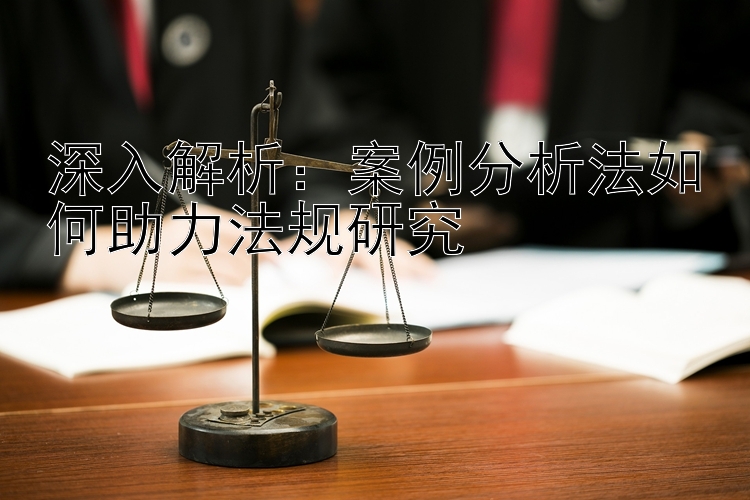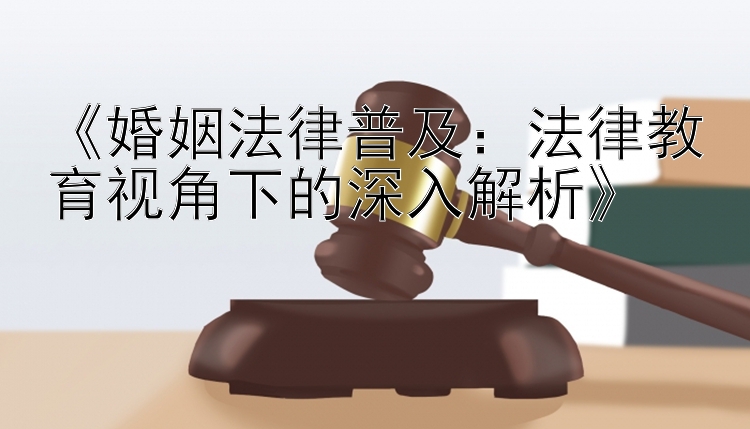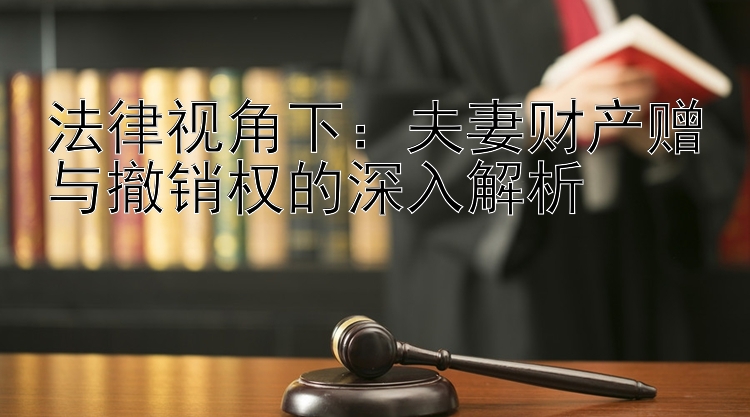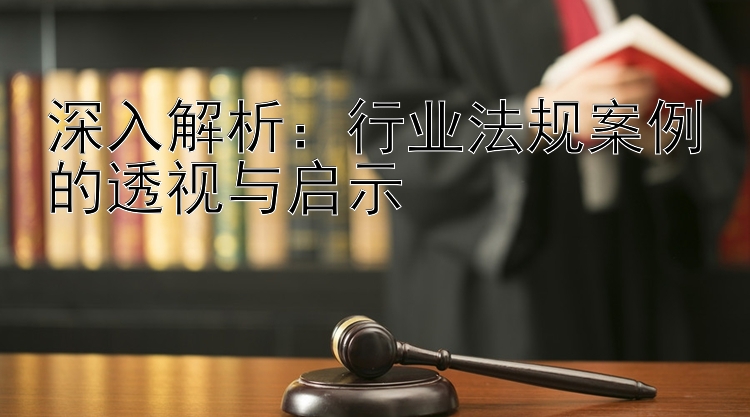深入解析:案例分析法如何助力法规研究
在法学研究和实践中,案例分析法是一种重要的方法论工具,它通过具体案件的分析和解读,帮助法律工作者理解、应用和解释法律法规。本文将探讨案例分析法在法规研究中的作用以及如何在实际工作中运用这一方法进行有效的法规研究和决策支持。
一、案例分析法的定义与特点 案例分析法是指通过对真实或假设的法律案件进行分析和讨论,以理解和评估不同法律情境下的法律原则、规则和程序的方法。这种方法具有以下几个显著的特点:
- 实践导向性:案例分析法强调从真实的司法实践中学习法律,使理论与实践紧密联系在一起。
- 综合性:案例分析往往涉及多个法律领域,要求综合运用多方面的法律知识和技能。
- 问题解决能力:案例分析有助于提高法律工作者的解决问题能力,使其在面对复杂法律问题时能做出更明智的判断。
- 教学相长:案例分析不仅是学习和研究的手段,也是教学的有效方式,有助于培养学生的批判性思维和法律推理能力。
二、案例分析法在法规研究中的作用 案例分析法在法规研究中扮演着多重角色,主要包括以下几点:
- 澄清法律规定:通过案例分析,可以将抽象的法律概念和规定应用于具体的案件事实,从而使得法律规定更加清晰易懂。
- 检验法律适用:案例分析可以帮助检查法律的正确适用,发现可能存在的错误或者不公正之处,为改进和完善法律提供依据。
- 预测判决结果:对类似案例的分析可以帮助预测未来法院可能的判决结果,为当事人提供合理的诉讼策略建议。
- 推动法律发展:通过对新类型案件的研究,可以为立法者和法官提供参考,促进法律体系的创新和发展。
- 教育培训功能:案例分析是法律教育和在职培训的重要内容,有助于提升法律工作者的专业素养和工作效率。
三、案例分析法的步骤和方法 在进行案例分析时,通常遵循以下步骤:
- 选择适当的案例:根据研究目的选择具有代表性和典型性的案例。
- 收集资料:搜集与该案相关的所有信息,包括但不限于判决书、庭审记录等。
- 分析法律关系:识别并分析涉案各方之间的关系及其权利义务。
- 确定争议焦点:找出案件的核心问题和关键法律点。
- 法律检索:查找与争议焦点相关的法律条款、判例和相关学术文献。
- 法律论证:基于事实和法律规范,提出合理的法律主张和支持理由。
- 结论和建议:根据上述分析得出结论,并为类似情况提出法律建议。
四、案例分析法的局限性与注意事项 尽管案例分析法在法规研究中有诸多优势,但也存在一定的局限性和需要注意的事项:
- 个案特殊性:每个案件的具体情况和细节都不同,不能简单地将一个案件的判决直接适用于其他案件。
- 时效性:法律环境会随着社会的发展而变化,因此过去的案例不一定完全符合当下的法律状况。
- 地域差异:不同国家和地区的法律体系和实践可能有很大差别,因此在跨国法律研究中应特别注意这一点。
- 伦理考量:在进行案例分析时,应尊重当事人的隐私权和其他合法权益,避免不当披露敏感信息。
五、结语 案例分析法作为一种行之有效的方法论工具,在法规研究中发挥着不可替代的作用。它不仅有利于加深对法律的理解,提高法律工作的质量,还有助于推动法律学科的发展和教育水平的提升。在未来,随着科技的发展和社会的进步,案例分析法将继续发展和完善,为法治社会的建设贡献力量。
【附】相关案例:“辛普森杀妻案”对美国刑事司法制度的深远影响
著名的“辛普森杀妻案”(O.J. Simpson murder case)是美国历史上最具影响力的刑事审判之一。该案的审理过程暴露了美国刑事司法制度的一些潜在问题,如警察执法过程中的种族偏见、证据采集的不当操作等。这些问题的揭露促使了有关连续
The O. J. Simpson murder case, often referred to as the "Trial of the Century" in the United States, was a criminal trial that put the nation's judicial system under intense scrutiny and raised questions about racial bias in law enforcement and the mishandling of evidence. The high-profile case has had far-reaching implications for American criminal justice, highlighting issues that continue to be addressed today.
Background: On June 12, 1994, Nicole Brown Simpson (Simpson's ex-wife) and Ronald Goldman were found murdered outside Nicole's home in Brentwood, Los Angeles. Despite initially being considered a suspect due to his history with domestic violence and the nature of the crime, O. J. Simpson denied any involvement. However, after gathering DNA evidence and other forensic data, police arrested him for the murders.
Legal Battle: The trial began on November 9, 1995, and lasted over nine months. It became a media spectacle, with live television coverage and daily updates in newspapers across America. The defense team, led by Johnnie Cochran Jr., argued that the LAPD had framed their client because of his race and that the prosecution's evidence was unreliable. They successfully cast doubt on the credibility of key witnesses and the handling of crucial pieces of evidence.
Verdict: After deliberating for less than four hours, the jury returned a verdict of not guilty on October 3, 1995. The decision shocked many Americans and sparked debates about the fairness of the trial and the state of the U.S. legal system. Many believed that Simpson had indeed committed the crimes but walked free due to technicalities and the incompetence of prosecutors.
Impact on Criminal Justice: The case brought attention to several critical aspects of the American criminal justice system:
-
Racial Bias: The defense strategy focused heavily on the alleged racism within the LAPD, which was already an issue at the time. This highlighted concerns about systemic discrimination in policing and the treatment of African American suspects.
-
Evidence Handling: Questions arose regarding how evidence was collected, stored, and tested. Some critics suggested that errors or even tampering may have occurred, leading to doubts about the reliability of certain types of evidence.
-
Celebrity Status: The case also underscored the influence of celebrity status in the courtroom. Critics claimed that Simpson's fame might have influenced jurors' decisions, potentially skewing the outcome of the trial.
Legacy: The O. J. Simpson murder case continues to resonate in discussions of American jurisprudence. It prompted reforms in how evidence is handled and emphasized the importance of procedural fairness in trials. Additionally, it shed light on the need for more diverse juries and increased sensitivity towards issues of racial inequality within the criminal justice system.








